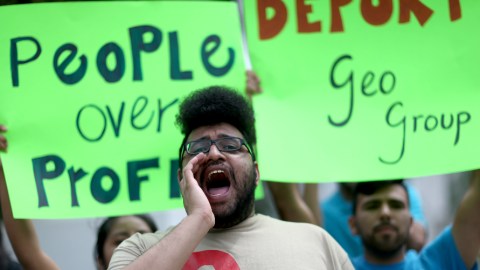It’s in America’s Best Interest to Rehabilitate Its Prisoners, Right?

Many would agree that “United States Department of Defense” is something of a misnomer, considering its main purpose is about the same as the Department of War and “National Military Establishment” it essentially replaced.
In America, the same can be said for the term “Department of Corrections.” Knowing that local and state corrections agencies oversee convicted criminals, you’d think based on a literal interpretation of the word that their primary goal would be rehabilitation — “correcting” bad behavior.
As Frank Denton writes in The Florida Times-Union, that just isn’t the case. Our prison practices don’t encourage rehabilitation any more than they promote the merits of sharp interior design. A fraction of inmates receive any kind of treatment. Education opportunities and vocational training are scarce and underfunded. Prisoners released without the skills necessary to succeed in society are more likely than not to be rearrested. Nearly one-third of released convicts in Florida with return to its prisons.
The question America has to ask itself: Are we okay with this?
Denton says we shouldn’t be. Here he is detailing issues in Florida that reflect national norms:
“We’re paying huge prices for our simplistic policy of locking ’em up and throwing away the key … Florida’s prison population has increased more than 400 percent over the past 25 years, from 19,692 inmates to 100,942, and the state Department of Corrections has grown to be one of the largest state agencies, with an annual budget of $2.3 billion (compared to $164.5 million in 1980).
Each inmate costs us about $20,000 a year. ‘We spend more general revenue on Corrections and Juvenile Justice than we do the State University System,’ says the Project on Accountable Justice at Florida State University…
Only 3 percent of the Department of Corrections budget goes to ‘Education and Programs.’ The average amount spent on education services was $1.01 per inmate per day.“
While the 1980s-’90s push to be “tough on crime” was successful in lowering crime rates across the country, Denton argues such success came at a steep price. There are now over 1.6 million people incarcerated in the United States, double what it was in the mid-’90s and by far the highest rate in all the world. Poor communities back home — particularly urban black ones that already have to contend with awful schools — struggle when around one-sixth of male adults are locked up.
So what’s Denton’s solution? He argues from a common position: Poverty incubates crime and our current system in turn incubates poverty. Breaking that cycle is key to progress. Not every prisoner, given opportunities to better his or herself, is going to take them and move on to leading an honest life. But ensuring those opportunities exist for those who want them is crucial to combating recidivism and all the expenses that come with it.
The counter-argument to Denton’s piece would focus on those low crime rates mentioned earlier. Poverty can never fully be eradicated, so crime will always exist. The current state of affairs is expensive and bloated, but keeping criminals off the street works. Those who enter incarceration hell for relatively minor criminal activities are collateral damage in a system designed to putting bad guys away.
The above argument answers the earlier question (Are we okay with this?) with a resigned “yes.” Cold-blooded? Sure. It’s an argument from the belief that there are more important things than so-called social justice.
I personally side more with Denton, mostly because on social issues such as this, I tend to side with the individual over society. I also think placing a keener focus on treatment and rehabilitation isn’t really all that much to ask. At the same time, I can understand the appeal of the counter-argument, even if most critics would label it callous, cruel, and unjust. The most important question here is what you, the reader as well as the rest of the society, think about this issue. Where do you stand?
Read more at The Florida Times-Union
Photo: BOCA RATON, FL – MAY 04: Ruben Hayslette and other protesters gather in front of the GEO Group headquarters to speak out against the company that manages private prisons across the United States on May 4, 2015 in Boca Raton, Florida. The protesters are condemning what they say are the company’s active lobbying efforts to criminalize and imprison immigrants and people of color and then to make a profit off their imprisonment. (Photo by Joe Raedle/Getty Images)





